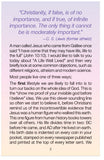A Life Well Lived (NIV)
Special-Order Folded Tract
 NOTE: This item is custom-printed to order (click for more details).
NOTE: This item is custom-printed to order (click for more details).
This tract is from our print-on-demand library, and is not kept in stock. Select the options below, and we will custom-print a batch just for you. Because this item is custom-printed, you can add your custom imprint to the back page at no extra cost.
- Estimated shipping date: Monday, February 2 (Click for more details)
- SKU:
- Discounts: Discount coupons do not apply to this item
- Format: Folded Tract
- Size: 3.5 inches x 5.5 inches
- Pages: 8
- Imprinting: Available with 5 lines of custom text
- Version: NIV
- Returns: Because this item is custom-printed to order, it cannot be returned.
Show all item details
The full text of this tract is shown below in the NIV version. (Do you want to print this tract in a different version than the one listed? Contact us and let us know what you're looking for—we may be able to create the alternate version for you at no charge.)
“Christianity, if false, is of no importance, and if true, of infinite importance. The only thing it cannot be is moderately important.”
—C. S. Lewis (former atheist)
A man called Jesus who came from Galilee once said “I have come that they may have life, life to the full” (John 10:10). I would like to talk to you today about “A Life Well Lived” and then very briefly look at some common objections, such as different religions, atheism and modern science.
Most people live one of three ways;
The first lifestyle we are likely to fall into is to turn our backs on the whole idea of God. This is the “show me proof of your invisible god before I believe” idea. We use this clever-sounding line so often we start to believe it, before Christians remind us of the incontrovertible evidence that Jesus was a human figure who walked this earth. This one figure from human history books towers over all others. His life divides time in two: BC before He came, and AD after He lived on earth. His birth date is indented on every coin in your pocket, stamped on every newspaper published and printed at the top of every letter sent. We choose to ignore Jesus Christ’s life, justifying our failures, overlooking our compromises and down playing our inconsistencies through a rose-colored look at our lives. We see ourselves as right in every situation, all the while knowing we have messed up.
A second lifestyle we fall into is to live a good life. We “do the right thing,” try to be upstanding, to be a good family member and donate to charity. Some of us even occasionally participate in the religion of our ancestors, but barely believe it or have made up our own version. We might have the veneer of a good life but are finding out (or have found out), that it is not the solid timber of “A Life Well Lived,” but only a surface achievement and hollow underneath.
Believe it or not, Jesus faced both these groups of people when He was here: prostitutes, tax collectors, and sinners on the one side and Pharisees, chief priests, and teachers of the Law on the other. Everyone expected Jesus to condemn the former group and to vindicate the latter. Instead, Jesus reached out to the sinners and tax collectors and encouraged them to repent of their Godless lifestyle. Surprisingly, He also warned the Pharisees and teachers of the Law most strongly that their veneer of religion was not real, and certainly not what God His Father wanted from people. Many of Jesus’ teachings and parables addressed these two categories, the empty “good and proper” life on the one hand and the outright rejection of God on the other.
One of Jesus’ most famous stories was of two sons, often called the parable of the Prodigal Son. You might have heard of it. The story goes that the younger son openly rejected his father, demanded his share of the inheritance and wasted it. Finally, he repents and returns to his father’s waiting forgiveness. The older son is often forgotten about, but is just as important or even more so going by the context. We are told that the older son stays and works for his father out of a sense of duty and spits out the words, “All these years I’ve been slaving for you and never disobeyed your orders. Yet you never gave me even a young goat so I could celebrate with my friends.” We are not told the end of the story, or what the elder son does, but Jesus is talking to Pharisees, trying to get them to stop looking down their self-righteous noses when they themselves are just as far from God. Their heart is distant from God even though they are claiming to serve Him—a veneer of godliness without the solid wood of a relationship with God.
The good news is that there is third way to live. Jesus did not come just condemning sin, but came to make a new way to live. It was neither stale religion, nor rejecting God altogether, but rather based on a relationship with God. Jesus told us we should relate to God as a child to a loving Father. Jesus talked about “Our Father in heaven” and told us we needed to join His family. Jesus was also very truthful and told us no one finds his way to God by himself. In fact, we have all rebelled against God and this rebellion stops us from getting to God. “For all have sinned and fall short of the glory of God” (Romans 3:23).
Jesus also taught that the way to join God’s family was that Jesus would take the punishment for our rebellion by dying in our place. In fact, that was the whole reason Jesus came to earth: to die in our place, and give us a spot in God’s Kingdom [family]. “For this purpose I came and was born into the world” (John 18:37).
So that leaves you and I with a radical new way of living, one secured by Jesus and open to us for a limited time. Yes, like all good deals this offer is only open to us while we live or until Jesus returns which ever comes first. To take up this new life, you need to turn towards Jesus and away from your former lifestyle. You need to admit your rejection of Him, either overtly (outright rejection of God) or covertly (Godless “good” life), and accept Jesus’ death was for you personally and on this basis start relating to God as your Heavenly Father.
To relate to God as Father, you will need to talk to Him (prayer), listen to Him (study the Bible), join the family (meet with other Christians), and open your entire life to God. You will find that He will teach, encourage, comfort, and correct you as you live out your new way to live.
A brief word on other religions. Many people worry about “all the people in the world who belong to other religions, what happens to them?” There are three things to say; firstly, you will stand before God and have to answer for you, as they will have to answer for themselves. You are only answerable for one life, namely yours. Secondly, it is popular these days to say all religions are the same, but even on the surface, this view is not sustainable. Buddhism believes there is no god, Hinduism believes in hundreds of gods, and Muslims believe there is one god. The idea that all religions are the same is logically unsustainable. Thirdly, those who promote the idea “all religions are the same” usually have not researched any of them, and put the idea forth in an effort to justify a Godless life.
There is a new aggressive atheism today which says it can only be God or science—you have to choose. If you listen to, watch, or read what these Atheists have to say, you will notice that most of their arguments are about an invisible god. And in that regard they are right: it is very hard to prove (and to disprove) an invisible god. I notice that they don’t say very much about Jesus—the historical, dateable, human figure, fact, flesh and blood, researchable Jesus. That one who I mentioned earlier, whose date of birth the whole world goes by. Every Easter, Christians remember as of crucial importance, Good Friday when Jesus died for us, and Easter Sunday when He rose from the dead.
Modern science has never been a choice of either science or God for many engaged Christians. Science is the study of discovering the function of this world—how the world works. Christianity allows us to discover the purpose of this life—or why we are here. Put simply, the Bible is not a book of science theory and should not read like one. Galileo said it best when he said, “The Bible shows the way to go to heaven, not the way the heavens go.” It is also true that some of our greatest scientists have also been strong Christians: Sir Isaac Newton and Robert Boyle, for example.
Thank you for taking the time to read my little pamphlet. I know some issues are quite detailed, and you’ll recognize that I have been very brief because of space. Hopefully you see that there are good logical answers to the questions most people have about Christianity. Let me finish with one of the wisest quotes I’ve ever heard:
“He is no fool who gives what he cannot keep to gain that which he cannot lose.” —Jim Elliot















